Existing User Log In
New User Registration
Register for a free account to gain full access to the VGChartz Network and join our thriving community.




Before diving into the game itself, I’m obliged to inform viewers that my experience with Control was limited to the Xbox One X. This isn’t a means of boasting but rather elucidating that previously-reported performance issues rarely applied to my situation. Of which I’m glad because minimal distractions got in the way of relishing this paranormal action romp. But it’s a shame I can’t guarantee that’ll be the same for every reader at this time.
After the good—albeit uneven—Quantum Break from 2016, Finnish developer Remedy Entertainment set out to expand upon their custom engine and concepts previously stowed away. They’ve succeeded handily in both respects. This developer’s penchants may seem familiar on the surface: third-person shooting, hard-boiled edge to the protagonist, and cinematic affectations. The difference here is the way in which these gameplay and storytelling templates are utilized to make Control so special.
Players take control of Jesse Faden, a young woman searching for answers relating to her history. Years of searching brings her to The Oldest House, headquarters of The Federal Bureau of Control (FBC). What seems like any another brutalist federal building in New York City is quickly revealed to be extraordinary in its uncanny interior size and paranormal properties. Within a short time span, Jesse goes from civilian to The Bureau’s Director in bizarre circumstances, thanks to the supernatural Service Weapon. With this, she’s now responsible for destroying the invading enemy known as “The Hiss.”
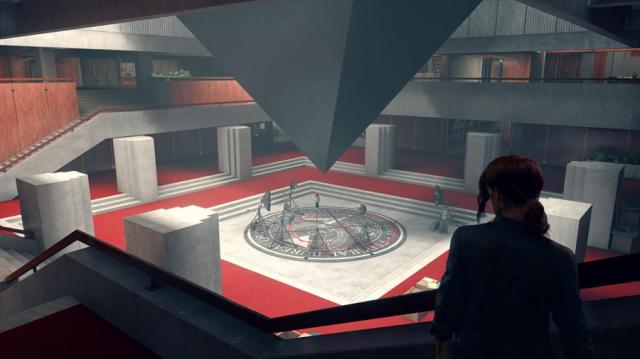
If coming in cold, you’ll likely have a dozen questions from the synopsis. A lot to take in, for sure. It's like the collected tapestry of the SCP Foundation website was uploaded to this bureau. New acronyms and words starting with “para—” or “astral” quickly begin to collect like grains of sand. There’s also a torrent of storytelling methods to grapple with: Jesse’s first-person mental monologues, distorted exchanges with Jesse’s ominous boss/bosses(?), live-action shorts that vary between separate collectibles or overlaid within the game (like a post-production trick found in film).
I’d be tempted to complain about sensory overload were it not so invigorating. It’s been a damn long time since this type of dense world has fallen into my lap. Like how Etherborn tested my spatial understanding through gameplay, Control challenges my initial narrative assumptions through world-building and an unsettling atmosphere; both leave me in a fatigued mental state after playing, just through disparate methods. The excesses of quick cutscene edits or the Hiss’ constant subliminal messages echoing off the walls not only feels strange but purposeful. Compared to the closet monsters in other games, there’s nary a time I could pin down what about this world disturbed me so much; as a result, I enjoyed it even more.
If there’s a staple more expected in a Remedy shooter than polished action it’s an internally-loquacious protagonist. When talking to side characters, the camera periodically cuts to Jesse’s eyes as we hear her internalized reaction to these new people. It’s a nice counterbalance easing you into understanding how she’s taking in this strange place, while parsing out her rationalizations. Like the overload of early information, I was off-kilter when considering Jesse’s apparent coldness—for lack of a better term. She doesn’t have the cynicism of Alan Wake dealing with writer’s block nor Max Payne’s edge and verbose similes. It’s not easy to think of her as a world-worn type of person either, despite her objections otherwise. As time goes on, however, the intent with her seems clearer and it’s helped in no small part by Courtney Hope’s solid performance.
Most of the side characters hit those quality strides as well. Without giving too much away though I will say one of the antagonists didn’t really click. The dynamic between him and Jesse feels like a tonal mismatch; one of those rare feats of being underdeveloped and uninteresting the more time spent around him. Not so for everyone else! Each human side character could be instantly recognized by silhouette and dialogue. There are the more expositional types like Emily Pope or the peculiar janitor Ahti whose knowledge and insults are seemingly unmatched by the rest. Although only seen in film shorts, Dr. Darling (Matthew Poretta, actor of Alan Wake) is another fine addition who’s married between scientific source explaining the paranormal activities and humorously misguided screen presence. I couldn’t get enough of him by the end. A shame the no-nonsense Helen Marshall leaves so early, though, suggesting she’s more important in scheduled upcoming expansions.
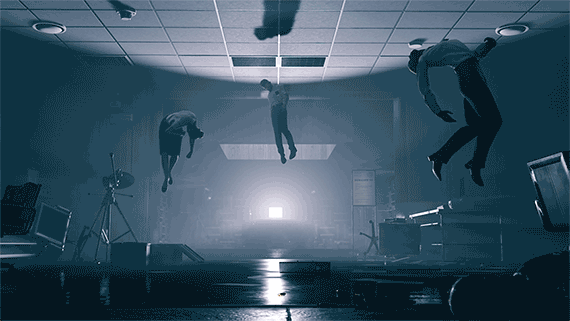
Overall, this is Remedy’s storytelling at its strangest and, possibly, its best. What seems like a strange decision in relegating the action to this one location becomes Control’s biggest boon. The setting becomes a unique voice and character, not unlike that of BioShock’s Rapture. But instead of a silent or more stoic protagonist, Jesse’s a rounded character with her own backstory and motivations whose progression is constantly engaging. I can foresee some complaints thrown at the ending. I do too in respect of gameplay, and the core narrative doesn’t deviate from a built-up framework. Obviously there are twists and turns, just scattered elsewhere. It’s a case of the more you ruminate about Control's unusual structure the more you admire it.
It’s fortunate Control’s gameplay shines just as bright—perhaps brighter—than the story. The first thing I did from the menu was assess and adjust gameplay options. I was taken aback by how meticulous and personal the game allows you to be. Along with expected visual and audio tweaks one can make, the granular gameplay adjustmets range from turning off aim assist to HUD notifications many devs assume you'd want to see. What’s the PC version doing on my Xbox One? Despite the disappointing lack of a performance mode it’s an impressive collection of preferences, all the same.
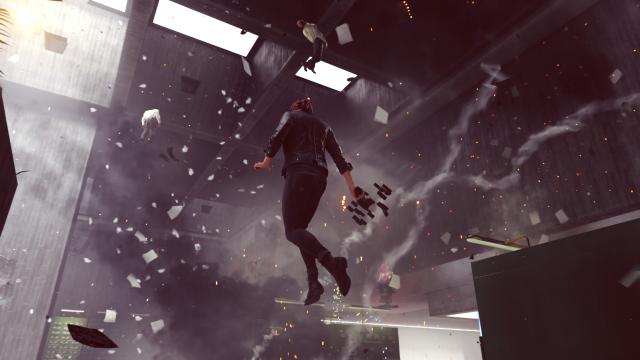
It’s a given the team who made stylized third-person shooting what it is today would have that aspect under wraps, with a few wrinkles to consider. Gone is the standard arsenal of real-world weapons; Jesse’s enigmatic weapon is an all-in-one armory. Limited to carrying two variants at a time, this gun is able to take the form of a standard pistol, SMG, shotgun, charge beam/sniper, or grenade launcher. Instead of ammo, weapon energy replenishes over time.
Should weapon energy be low or tapped out, Jesse’s other option is an array of offensive and defensive telekinetic abilities. There are the expected abilities shown throughout various trailers such as levitating (similar to Peter Pan) or hurtling virtually any object at an enemy. Heck, a chunk of concrete from the floor can be used when a chair or desk can’t be found. Like Jesse’s gun, her powers spend personal energy.
These two pillars of combat makes Control’s elegant power-fantasy so rewarding. Although you’re sure to overuse Jesse’s Launch ability, your weapon loadout and approach to the plurality of Hiss combatants can wildly vary. A friend could detail how they played conservatively with charged shots behind cover; another could talk about an up-close-and-personal approach by offsetting damage taken with immediate health pickups from dead enemies. As these powers expand the synergy between Jesse and her weapons grows, allowing for a plethora of fresh strategies within each combat arena.
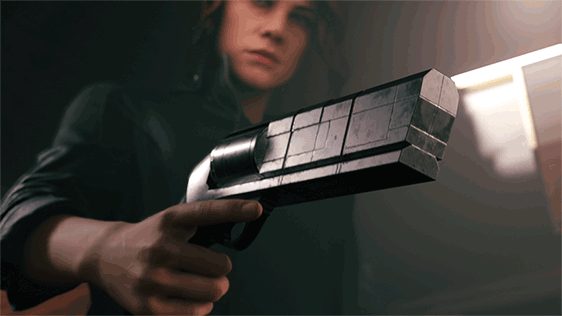
Said foundation is only enhanced by one of the most stylized shooters of this generation. Remember Neo & Trinity’s lobby shooting scene from The Matrix? The aftermath of each fight here is reminiscent of it: the carnage met upon the walls, struts, and floors demands them to be remodeled top to bottom. This is what game sharing and screenshots are made for. Beyond the bombast, the finer details are awesome too. The intricate shape-shifting of the Service Weapon visually communicates which firing mode you’ve selected. Even aiming down sight shows its uncanny nature as stray pieces slightly move in and out of place. Substituting blood, killing Hiss results in this crimson-tinged translucent mist that slowly fades away. Even the sensational animations and sound design in Jesse’s Launch can be broken down frame-by-frame to examine the fluidity. Each grab feels like a telekinetic Shot Put flying away at terminal velocity. All these contextual layers of destructibility, the punchy audio-visual feedback, and much more go into making this one of the most maximalist shooters out there.
Keeping that busyness from bloatedness is a clean & well-integrated UI. Whether it’s the enemy’s minimized health bars, the HUD indicator for what you’ll launch, or the thoughtfully-considered target markers, every bit of necessary information looks appropriate to the setting without obstructing the flow of combat. In a weird way, the BIG font used when reaching an important destination pops out even more when thrown on-screen. Even the minute detail of the map layout looks crisp. Aside from the slight incoordination of how the map translates a sector’s different levels, this is one of the most successful UI’s of this year both in its austere personality and function.
Like the RPG-lite models found in many shooters, gunplay and telekinetic powers are undergirded with ability upgrades and mods. Completing main or critical side objectives will result in ability points which will permanently augment Jesse’s telekinetic catalogue. Mods (of five different tiers) can be collected from dead bodies or stashboxes placed across the map. They run the expected gambit to help personalize your weapon portfolio: dampened recoil, reduced energy cost per shot, quicker fire rate, etc. etc. Accumulating special items along with in-game currency, dubbed “Source,” can eventually lead to upgrading weapon variants to attach more mods at once (max of 3). The panoply of specialty items can get obnoxiously varied, but what seems like another checkmarked item of 2019 games feels necessary when dealing with increasing difficulty.
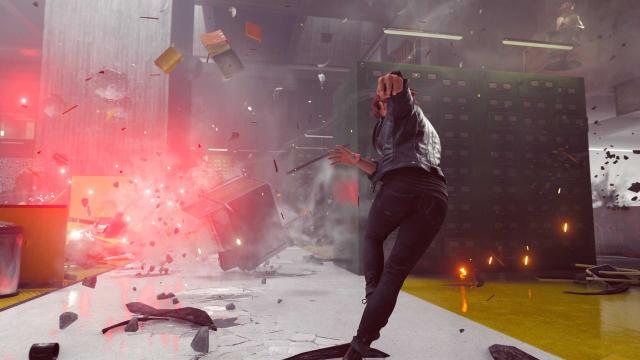
Not feeling in place for modern games is the design ethos behind exploration. For a technical marvel of this caliber, Control sometimes feels like it’d be more at home in an earlier generation. I can imagine thought bubbles forming for various game designers thinking back to game guides in magazines. “Yes, the game only takes place in this building but it’s different.” That’s been about as much as I could squeeze in before a sense of disinterest sets in with some friends. But this is different. The Metroidvania construction of The Oldest House is one of the best-designed gaming worlds because of having so much latitude to play with alternate dimensions. Some of Remedy’s best content is off the beaten path, and I can’t laud it enough. Others may be apt to complain about poor signposting though. But it's in having an obscure alternative and subtler hints that Control demands attentive behavior for its intricately-made labyrinth.
Even the smaller details get my attention: health isn’t auto-regenerative, control points effectively replace an auto-checkpoint system, there are selectively-respawning enemies, and more. I’d imagine these less-popular choices could leave some players reticent to the game entirely. I’m left appreciating just how carefully considered each small cog felt and how they add to the greater whole.
Whether it’s the nuances or grand scale schemes, Control hits the perfect middle between throwback and contemporary ideals. Top-shelf audio-visual design bolsters this even more.
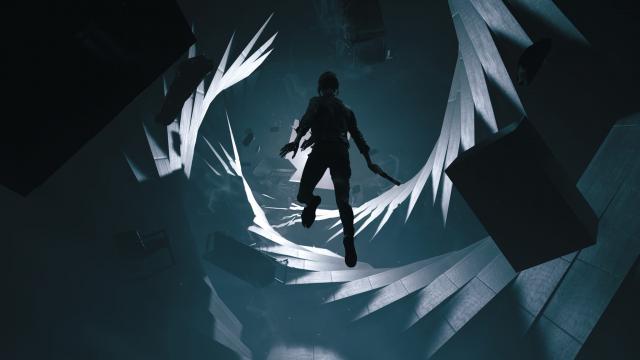
Although I’d love to expand upon the physics system and stuff I’ve previously detailed, I do believe it’s fair to touch on technical issues that I’d hinted on at the start. I began this a day or two after release and only played on Xbox One X. Those are two important qualifiers, especially when considering the release-day update; even still, my experience wasn’t without issues. Framerate drops sometimes occurred during bombastic moments or loading into a control point which triggered a wave of enemies. Sometimes the map blueprint wouldn’t fully load, leaving me seeing a floating red marker (icon for Jesse’s location) and the text of discovered areas. All said, these annoyances were infrequent and minor enough to never dampen my enthusiasm to continue forward—unlike my experience in Gears 5.
Despite being one of the most lurid power-fantasies of the year, Control wouldn’t garner this level of enthusiasm were it not for sound. Questionable though some of 2019’s content has been, it’s been a phenomenal year for soundtracks. The combined wizardry of Petri Alanko and Martin Stig Andersen (of INSIDE fame) here bolsters that opinion. This is another entry deserving end-of-year nominations. Just like with Alan Wake, previous collaborators Poets of the Fall make a comeback in one of the best in-game ways possible. If there’s one complaint to have against the sound design it's that pistol and SMG shots lack a greater punch. And that’s weird when compared to other aspects. The detail throughout the various telekinetic powers, the boom of explosions, the battering ram of a shotgun, and everything else hit the mark.
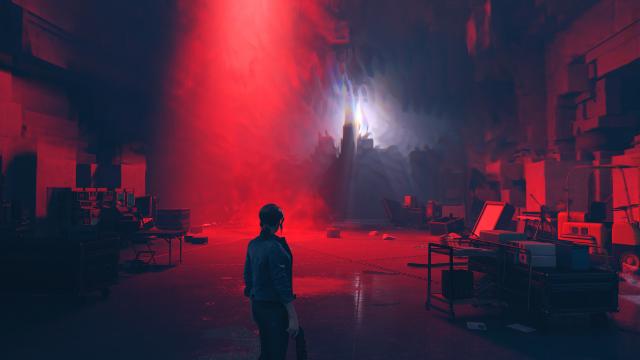
Remedy is in an interesting place with Control. It’s the culmination of their back catalogue folded into one: the atmosphere & narrative involvement of Alan Wake, a more layered open-world from Alan Wake’s American Nightmare, and a more aggressive attitude like Quantum Break—while sporting the same game engine. It’s effectively a Greatest Hits album wrapped in a new IP. And it's also Remedy’s second title to reside as one of my favorites of this decade.









